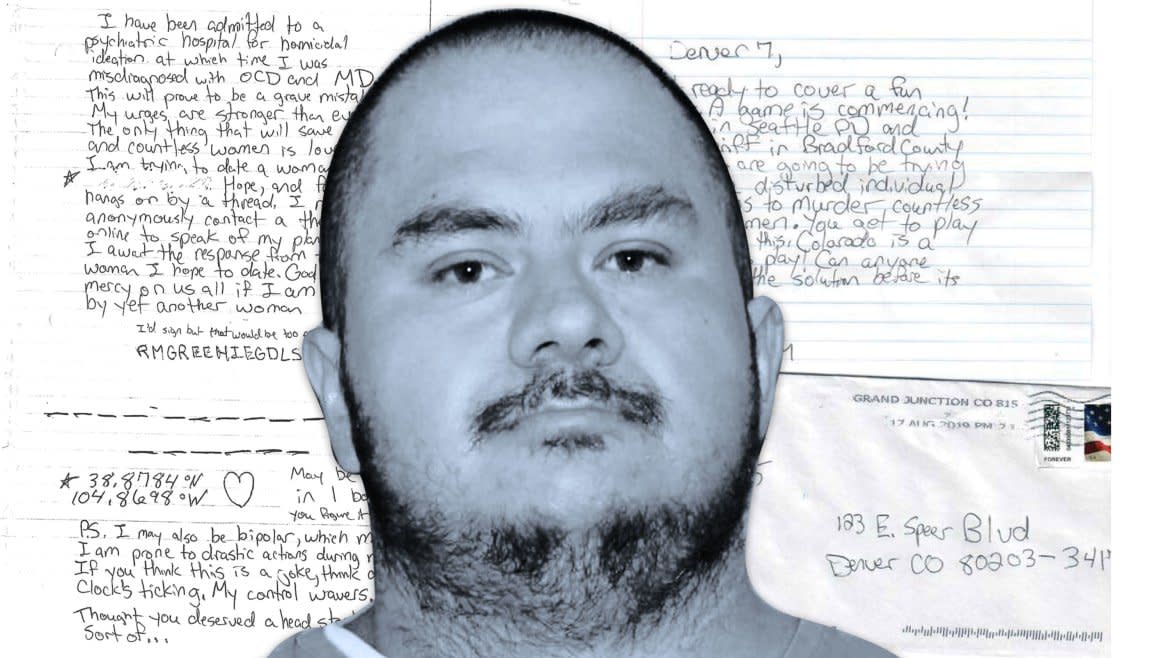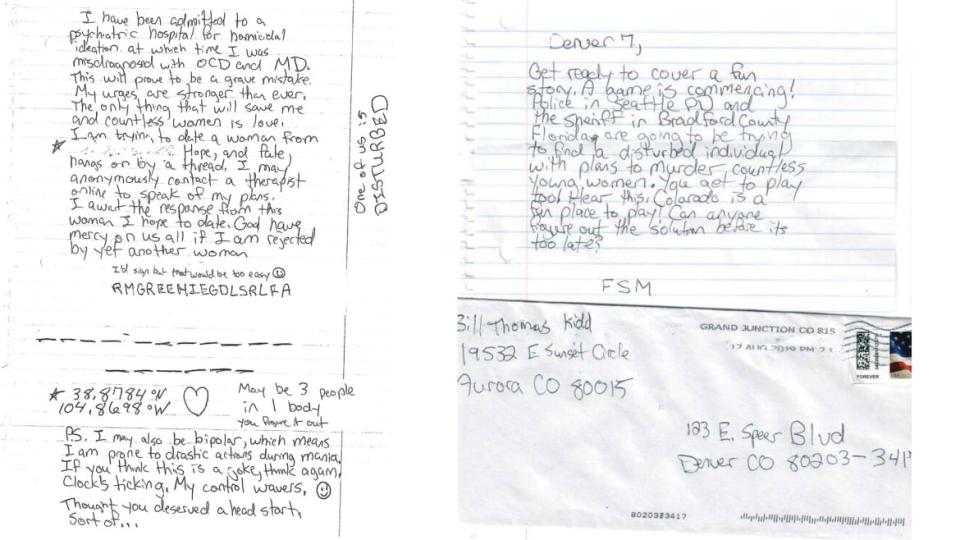Wannabe Serial Killer Taunted Cops: ‘Every Time I See Young Beautiful Females... I Want to Strangle Them’

Detective Logan Hough got the call at about 9 a.m. on a sweltering late-August day in North Florida. Someone at the court clerk’s office had opened a letter that he should see right away.
The letter had been intended for the Bradford County Sheriff’s Office where he works, but it had gotten mixed up in the mail. Deliveries there get mixed up all the time. The address for the clerk’s office begins with 945. The address for the sheriff’s office is 945-B.
What Hough found inside the envelope was unlike anything he had seen.
It read like the plans of a serial killer.
“Every time I see young beautiful females, ages 15-30, I so badly wish to lure them to my van, take them to a remote location, and pleasure them,” the handwritten letter said. “When they are thoroughly pleasured, I want to strangle them, either with my hands or a ligature.”
The letter went on in grisly detail about how the writer planned to dismember the bodies, cutting off the women’s fingers and scattering them to “increase the size of the crime scene and throw off law enforcement.”
It also included a list of things the writer planned to do to prepare for his crimes, including purchasing items like handcuffs, a hand saw, pruners, stretch wrap, latex gloves, “cannabis product to relax the woman/girl,” and, most chillingly, “bags for transport of head and fingers.”
The three-page letter carried no name, but it included a cipher at the end, taunting the recipients in a Zodiac-like fashion to figure out who sent it. “I’d sign but that would be too easy,” it said.
It also bragged “Fingerprint Free!” with a smiley face drawn next to the phrase.

“That was part of his game that he was playing,” Hough said in a recent interview with The Daily Beast. “He had all his plans laid out and a shopping list and everything. We definitely took it as a serious threat.”
The FBI did too. Not long after receiving the letter, Hough got a call from a special agent in Colorado.
There were other letters, the agent told him. On the opposite side of the country, the Seattle Police Department had received a letter identical to the one sent to Florida. A television station in Denver, ABC affiliate KMGH, had received a single-page letter from the same writer.
“Get ready to cover a fun story. A game is commencing!” the Denver letter said. “Police in Seattle PD and the Sheriff in Bradford County Florida are going to be trying to find a disturbed individual with plans to murder countless young women.”
The “game,” however, did not get far.
On Aug. 29, federal authorities arrested 33-year-old Daniel Alfred Gallegos of Grand Junction, Colorado, and accused him of sending the threatening letters. A federal judge has since ordered Gallegos held without bail, finding him to be a danger to the community.
Court documents describe how FBI Special Agent John Busch was able to crack the case without anyone getting hurt.
It all came down to the postage stamps.
Affixed to the envelope for each letter was a stamp seemingly as generic as could be—adorned with an American flag and the initials USA. But on the left side of each stamp was also a tiny barcode and serial number.
With the help of U.S. postal inspectors, Busch was able to track the three stamps back to a kiosk in a post office in Grand Junction. The kiosk also captured surveillance footage of the buyer as well as his credit-card info.
The card, according to court documents, was owned by Gallegos, and the face in the surveillance footage matched his picture from his driver’s license.
It was enough for a judge to sign off on an arrest warrant and for Busch to make the collar the next day.

Not much is publicly known about Gallegos, and the public defender assigned to his case declined to be interviewed for this article.
However, court documents describe Gallegos as a drifter, possibly homeless and living out of his silver Chrysler minivan, with a recent history of run-ins with the law.
In October 2018, Grand Junction police responded to a call from Gallegos’ wife, who said her husband was threatening to kill himself. When officers arrived, according to records, Gallegos said his medications were off and “that he felt like killing.” He was taken to a nearby psychiatric hospital.
About a month later, police were called again by Gallegos’ wife. This time, Gallegos was armed with a knife and told officers “about being cannibalistic and that he was going to eat people.” Again, he was taken to the same hospital.
In June, according to court records, Gallegos was arrested on suspicion of domestic violence against his wife in an incident that occurred inside his van. The details of that incident were not immediately available.
During his investigation, Busch learned that Gallegos had lost his job in February after a mental-health provider notified his employer about his “homicidal ideations.”
The letters that were sent to Bradford County and Seattle specifically addressed multiple mental-health diagnoses.
“I have been admitted to a psychiatric hospital for homicidal ideation at which time I was misdiagnosed with OCD and MD,” the letters said, likely using the abbreviations for obsessive-compulsive disorder and major depression. “This will prove to be a grave mistake. My urges are stronger than ever.”
In a post-script, the writer of the letter mentioned another possible diagnosis.
“I may also be bipolar, which means I am prone to drastic actions during mania,” he wrote. “If you think this is a joke, think again. Clock’s ticking. My control wavers. Thought you deserved a head start. Sort of.”
In the court documents, there was no evidence—other than his say so—that Gallegos had indeed been diagnosed with any specific mental illness. And it’s important to note that research published by the American Psychological Association has shown that mental illness and crime are not generally linked.
The capture of Gallegos brought a sigh of relief for Hough, the Bradford County detective.
“It’s very unusual for our area. We don’t typically see or hear things like this,” Hough said. “He’s got a lot of details, sounds like he’s been thinking about this or planning this for a while.”
Bradford County Sheriff’s Major Brad Smith said the quick work was a testament to the kind of cross-country coordination that law enforcement can do these days. It’s a result of lessons learned over decades of dealing with serial killers and mass shooters, he said.
“We’re getting better understanding that when they make these threats, they’re not idle,” Smith said. “You have to follow up on them and you have to pursue them like it’s going to happen.”
Get our top stories in your inbox every day. Sign up now!
Daily Beast Membership: Beast Inside goes deeper on the stories that matter to you. Learn more.

